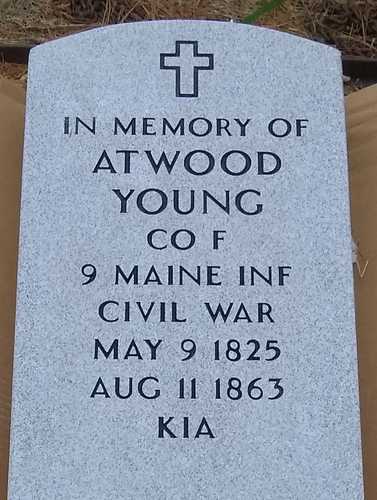Keywords: Great War
Item 104325
An issue of "Big Guns" for selling war stamps, World War II pamphlet, ca. 1943
Contributed by: Maine Historical Society Date: circa 1943 Media: Lithograph
Item 23259
War Relief Fundraiser, Biddeford, 1917
Contributed by: McArthur Public Library Date: 1917 Location: Biddeford Media: Photographic print
Exhibit
Great Cranberry Island's Preble House
The Preble House, built in 1827 on a hilltop over Preble Cove on Great Cranberry Island, was the home to several generations of Hadlock, Preble, and Spurling family members -- and featured in several books.
Exhibit
In 1954, November 11 became known as Veterans Day, a time to honor American veterans of all wars. The holiday originated, however, as a way to memorialize the end of World War I, November 11, 1918, and to "perpetuate peace through good will and mutual understanding between nations." Mainers were involved in World War I as soldiers, nurses, and workers on the homefront aiding the military effort.
Site Page
"<http://en.wikipedia.org/wiki/Doughboy>. "The Great War". Web. <http://www.pbs.org> "Lincoln, Maine". Web. <http://www.lincolnmaine.org>."
Site Page
Highlighting Historical Hampden - War of 1812
"With great difficulty, he managed to sail his ship to Crosby’s Long Wharf in Hampden for repairs. Having taken Castine on September 1, 1814, British…"
Story
An allegory about the Vietnam war
by Bill Hinderer
An allegory about my service in the Vietnam War
Story
Civil War Soldier comes home after 158 years
by Jamison McAlister
Civil War Soldier comes home after 158 years
Lesson Plan
Longfellow Studies: The Exile of the People of Longfellow's "Evangeline"
Grade Level: 6-8
Content Area: Social Studies
Other materials needed:
- Copy of Henry Wadsworth Longfellow's "Evangeline"
- Print media and Internet access for research
- Deportation Orders (may use primary document with a secondary source interpretation)
Throughout the course of history there have been many events in which great suffering was inflicted upon innocent people. The story of the Acadian expulsion is one such event. Britain and France, the two most powerful nations of Europe, were at war off and on throughout the 18th century. North America became a coveted prize for both warring nations. The French Acadians of present day Nova Scotia fell victim to great suffering. Even under an oath of allegiance to England, the Acadians were advised that their families were to be deported and their lands confiscated by the English. This event was immortalized by Henry Wadsworth Longfellow's epic poem "Evangeline", which was published in 1847.
Lesson Plan
Grade Level: 9-12
Content Area: Social Studies, Visual & Performing Arts
When European settlers began coming to the wilderness of North America, they did not have a vision that included changing their lifestyle. The plan was to set up self-contained communities where their version of European life could be lived. In the introduction to The Crucible, Arthur Miller even goes as far as saying that the Puritans believed the American forest to be the last stronghold of Satan on this Earth. When Roger Chillingworth shows up in The Scarlet Letter's second chapter, he is welcomed away from life with "the heathen folk" and into "a land where iniquity is searched out, and punished in the sight of rulers and people." In fact, as history's proven, they believed that the continent could be changed to accommodate their interests. Whether their plans were enacted in the name of God, the King, or commerce and economics, the changes always included and still do to this day - the taming of the geographic, human, and animal environments that were here beforehand.
It seems that this has always been an issue that polarizes people. Some believe that the landscape should be left intact as much as possible while others believe that the world will inevitably move on in the name of progress for the benefit of mankind. In F. Scott Fitzgerald's The Great Gatsby a book which many feel is one of the best portrayals of our American reality - the narrator, Nick Carraway, looks upon this progress with cynicism when he ends his narrative by pondering the transformation of "the fresh green breast of a new world" that the initial settlers found on the shores of the continent into a modern society that unsettlingly reminds him of something out of a "night scene by El Greco."
Philosophically, the notions of progress, civilization, and scientific advancement are not only entirely subjective, but also rest upon the belief that things are not acceptable as they are. Europeans came here hoping for a better life, and it doesn't seem like we've stopped looking. Again, to quote Fitzgerald, it's the elusive green light and the "orgiastic future" that we've always hoped to find. Our problem has always been our stoic belief system. We cannot seem to find peace in the world either as we've found it or as someone else may have envisioned it. As an example, in Miller's The Crucible, his Judge Danforth says that: "You're either for this court or against this court." He will not allow for alternative perspectives. George W. Bush, in 2002, said that: "You're either for us or against us. There is no middle ground in the war on terror." The frontier -- be it a wilderness of physical, religious, or political nature -- has always frightened Americans.
As it's portrayed in the following bits of literature and artwork, the frontier is a doomed place waiting for white, cultured, Europeans to "fix" it. Anything outside of their society is not just different, but unacceptable. The lesson plan included will introduce a few examples of 19th century portrayal of the American forest as a wilderness that people feel needs to be hesitantly looked upon. Fortunately, though, the forest seems to turn no one away. Nature likes all of its creatures, whether or not the favor is returned.
While I am not providing actual activities and daily plans, the following information can serve as a rather detailed explanation of things which can combine in any fashion you'd like as a group of lessons.














